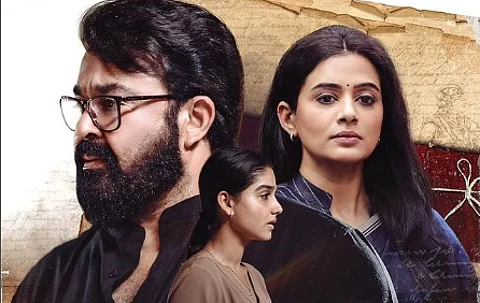Neru review: Mohanlal is no-nonsense in Jeethu Joseph’s poignant court drama
Neru (Malayalam)(3 / 5)
** spoiler alert **
The intros to their movies can be trying, but when Mohanlal and Jeethu Joseph come together, something wondrous is expected to unravel midway, as it did with their most famous outing, Drishyam. Somewhere between the [many] moments of sad cliches and superfluous lines in Jeethu Joseph's new Mohanlal film Neru, an engaging court drama can be uncovered. Despite its amateurish setting, Neru becomes an important film with a few careful arguments, strongly worded and delivered by its key actors, from Mohanlal to Anaswara Rajan.
From a few quickly sewed-up sequences at the beginning, it is understood that a young, blind woman has been raped at her house while her parents and the woman who looks after her had gone out. The survivor, a sculptor, is able to carve out a nearly accurate model of her attacker’s face; and the police, led by actor Ganesh Kumar, nabs him before he takes off on a flight. Jeethu, unlike in his famous family thriller Drishyam, does not take long to create the setting. There are no depictions of family love or interactions between the survivor and her pained parents (played by Sreedhanya and an-always-reliable Jagadish). Instead, it all comes out amid the court scenes, more organically.
Mohanlal is introduced with only a faint background music as a once-known lawyer who has gone out of practice for many years. Bearded, spectacled, and surrounded by law books in a house where he lives alone, Vijayamohan is a practical, no-nonsense professional, who says that he is not competent or confident enough to take up the survivor’s case. A talk between the lawyer and the survivor changes his mind, with Santhi Mayadevi, who has co-written the script with Jeethu, playing the mediator.
Watch: The trailer of Neru
Siddique and Priyamani play the lawyers of the accused, and the majority of the film is set in a court. The early scenes introducing the high-profile lawyers and the influential family of the accused are stagey and full of cliches, best left unmentioned. These are also put together like a hurried montage, though the later court scenes are more relaxed. Also annoying are the sequences of media reportage outside the courtroom – used mostly as a tool to fill gaps between court sittings – but that can perhaps be attributed as a nod to the noisy language of visual journalism today. Music is often used as an obvious aid to the setting, but sometimes, like in the ending where it is meant to be uplifting, it works.
Arguments between the advocates, especially from the supposedly-big shot of a lawyer, played by Siddique, are below the belt. Mohanlal, appreciably, does not spend time on preachy monologues or smart comebacks, but plays the rooted advocate focussed on the job at hand, subdued and contained. It is a joy to see him not having to play the loud and overbearing wisecracker yet again. It is also undoubtedly inspiring to his many followers, to hear him speak for a new generation of women, unwilling to stay quiet with the ‘shame’ forced upon them, and tell off the victim-blamers for their petty, narrow thinking. This and a bold retort by the survivor in court, breaking down what consent means, are both performed with an admirable precision. For presenting these sides, even as discussions on sexual harassment in the film industry are vague and discouraged, Jeethu and Santhi deserve a pat.
Jeethu is, as he has proved before, also good with investigative procedural dramas. If he used it to the advantage of the defense in Drishyam, here, he builds the case for the prosecution. Only if he is willing to cut down on the obvious theatrics of his scripts (like the accused who has to smile wickedly every time an evidence in his favour is presented), his thrillers – which he insists on calling dramas – can go a long way.
Disclaimer: This review was not paid for or commissioned by anyone associated with the film. Neither TNM nor any of its reviewers have any sort of business relationship with the producers or any other members of its cast and crew.

